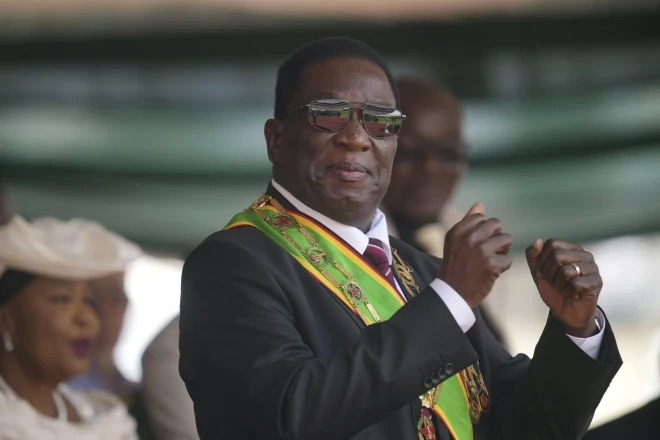
PRESIDENT Emmerson Mnangagwa may be described as a busybody, solely for the love of political power and by fair and foul means.
His ubiquity or call it everywhereness or by whatever name you want to call it, is unparalleled by any standards in the African context. Mnangagwa believes very much in quantity and not quality.
The latter is not in his vocabulary; it is a luxury he can ill afford. Unfortunately, his obsession with quality has pervaded the entire Zimbabwean society. Every Zimbabwean regardless of class, social status, educational level or station is dismissive of quality.
I don’t think it’s fair to begrudge Mnangagwa for the in-exhaustive energy he apparently possesses. He is in Binga in the morning, somewhere else in the evening and early the following day he is praying with apostolic sect congregants.
All this is squeezed into a 24-hour day, a period in which the late former President Robert Mugabe would still have not decided which suit from his wide range would best satisfy the occasion.
Citizens Coalition for Change (CCC) Nelson Chamisa would either be still in his legal chambers polishing up a defence submission or an argument “in limine,” or on the pulpit thumping the Holy Bible.
For good intent or evil, Mnangagwa believes in political mileage. In all honest, his development strategies are all hot air which are dramatised and repeated so that at the end they become the truth to the gullible. He is very much cognisant of the fact that there is no effective opposition in Zimbabwe to tamper with his strangle-hold on power.
He has weakened all the structures of governance including the Constitution which clearly now is a statutory document representing the ruling Zanu PF. Frankly, there is no effective opposition in Zimbabwe.
- Mavhunga puts DeMbare into Chibuku quarterfinals
- Battle of Zim abandoned
- Young vocalist making southern Africa dance
- Chamisa party defiant after ban
Keep Reading
The August 2023 harmonised general elections are the death knell sounding the demise of CCC. This party does not represent the workers, meaning the bourgeois or proletariat or wage earners, or the common people.
Now we have lawyers and teachers who want to aggrandise space by being trade union leaders on the one hand as well non-governmental organisations executives on the other. The economy is in tatters, thus presenting an opportune time for the workers to exploit it to their advantage.
The problem is that the lawyers and the teachers masquerading as politicians are stymieing the people’s efforts. Just as well they will disintegrate sooner than later.
Chamisa’s verbosity renders his speeches barren. For him, it's either the pulpit or the podium. -
Zesn does not train polling agentsTHE Zimbabwe Election Support Network (Zesn) refutes allegations levelled against it by Zanu PF finance department on training of polling agents that will participate in the upcoming August 23 elections.
It is alleged in the Zanu PF finance department Press statement that was issued and signed by party secretary for finance Patrick Chinamasa on June 20 that: “It has come to the notice of the Zanu PF department of finance that the UK, France, Australia, USAid Sweden, Japan, the US embassy in Harare, the US-based National Democratic Institute (NDI) and the EU, USA and the UK funded Zesn and Election Resource Centre (ERC) have announced that they are putting together a donation of US$10m for the training of 12 500 election agents for each of the political parties participating the forthcoming harmonised elections.
“I wish it to make it abundantly clear that such offer of funding is illegal and in direct violation of section 6 of the Political Parties (Finance) Act chapter 2:11 which provides that ‘no political party, member of a political party or candidate shall accept any foreign donation whether directly or from a donor or through a third person’.”
Zesn would like to categorically state that it does not train political party agents and has not received donor funding for the purposes of training any political party agents or candidates.
The network’s mandate is to promote democratic elections in Zimbabwe through domestic oversight on all electoral processes such as voter registration, nomination, pre and post electoral environment and polling day processes among others. Further, Zesn undertakes advocacy interventions on electoral reforms in a bid to create a conducive electoral environment and to enhance credibility and integrity of electoral processes; conducts civic and voter education and strives to provide credible electoral information to the electorate and key electoral stakeholders.
Over the years, the network has always shared its observation reports with all key electoral stakeholders including the Zimbabwe Electoral Commission (Zec) as required by Section 40 G (1) (d) of the Electoral Act on the Functions of Accredited Observers. The section provides that; Persons who are accredited by the commission as observers of an election shall be entitled to do all or any of the following… to provide the commission with a comprehensive review of the election taking into account all relevant circumstances, including— (i) the degree of impartiality shown by the commission; and (ii) the degree of freedom of political parties to organise, move, assemble and express their views publicly; and (iii) the opportunity for political parties to have their agents observe all aspects of the electoral process; and (iv) the fairness of access afforded to political parties to the national media and other resources of the State; and (v) the proper conduct of the polling and the counting of the votes at the election; and (vi) any other issue concerning the essential freedom and fairness of the election.
Zesn, therefore, pursues its work guided by the Electoral Act, Zec Code of Conduct for observers and its values and principles as an independent and non-partisan organisation. Further, the network observes and is guided by Sadc Principles and Guidelines on the Conduct of Democratic Elections and the African Charter on Democracy, Elections and Governance which Zimbabwe is signatory to.
Zesn reiterates that it does not and will not finance and or train any political party agents as this is not part of its core business and mandate, neither does Zesn support or endorse any political party or candidate in Zimbabwe. - Zesn
What happened, why it is important?JUNE 21, 2023 was an important day in the roadmap to harmonised elections. Zimbabwe is conducting elections to elect the President, parliamentarians (this includes Senators and Members of Parliament) and councillors on the 23rd of August 2023, in what is called a harmonized election. It is harmonised in the sense that all the three elections will be held at the same time rather than individually at different dates.
What is nomination?
Simply, this is a process in which potential candidates to contest in an election are presented for vetting and approval by the nomination courts, guided by the law of Zimbabwe. It is not just for political parties, but also individuals choosing to contest are free to submit their completed nomination forms. In recent months and weeks, political parties have been conducting internal processes of getting candidates to field for contest. These are called primary elections. It is believed that as of June 21, 2023, all parties interested in contesting in this election, presented their nomination papers at designated nomination centres across the country.
Why is this important?
- This is part of our electoral system and process laid down in the law, so it must be followed to demonstrate commitment to the rule of law and the principle of constitutionalism,
- Citizens are given the platform to exercise their rights including participating in the electoral processed either as voters or as potential candidates,
- Eligible candidates are confirmed after their nomination papers have been reviewed.
This review can lead to qualification or disqualification following guidelines in the law,
- Zec is provided with useful information ie names and number of candidates and parties to help them prepare for the elections, for example in designing and printing of ballot papers,
lIt marks the heightening of the political campaigning period during this election phase of the electoral cycle,
Overall, this process helps assess the readiness of stakeholders (the Zec, political parties, independent candidates, judiciary, and the police) to conduct, support and participate in the harmonised election scheduled for the 23rd of August 2023. - Election Resource Centre







